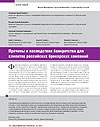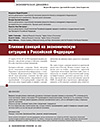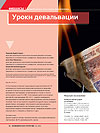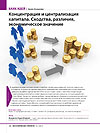Bankruptcy Causes and Consequences for Clients of Russian Brokerage Companies
The present study examines the causes and consequences of bankruptcy for clients of brokerage companies in Russia, as well as assesses measures taken to overcome the problems of brokerage companies bankruptcy, which actually lead to investors financial ruin. The relevance of the study is based on the need of this issue to be regulated by the state in order to protect the investors’ interests, to develop and stimulate the financial market, and also to increase the level of Russians’ financial literacy. The article identifies the main causes and consequences of brokerage companies’ bankruptcy.









